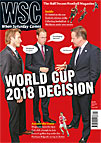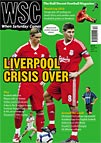 by Lutz Pfannenstiel
by Lutz Pfannenstiel
Vision Sports, £12.99
Reviewed by Jon Matthias
From WSC 344 October 2015
The slogans on the cover indicate that this is more than a journeyman footballer’s lifestory. “Died on the pitch”, “Kidnapped a penguin”, “Played on six continents”, “Wrongly jailed for match-fixing”, “Lived in an igloo”, “Played against Beckham” and so on. The igloo, it turns out, is a throwaway reference about a stunt to raise awareness of climate change.
What really stands out throughout Lutz Pfannenstiel’s story is his naivety, which seems undiminished after several years. Born in Bavaria in 1973, his globetrotting career began aged 19 when he met an “agent” and flew to Malaysia for a pro contract that never materialised. Fifteen years later he is recruited for a new super-club in Armenia, but the money runs out before the season starts.
Being overly trusting led to his match-fixing conviction and five-month prison sentence in Singapore. One night he was followed home by a fan who had recognised him in a restaurant. Normal people might be suspicious of that but Pfannestiel befriended the fan, who almost inevitably worked for a betting syndicate. Pfannestiel thought they had just been chatting about football, but when the friend gets busted by the Singaporean Corrupt Practices Investigation Bureau he says Pfannenstiel was supplying information. The experience of prison is not overly elaborated, but the bare details are horrible enough.
The book is reasonably well written (possibly due to the assistance of journalist Christian Putsch), but padded out by cliches and familiar facts about places he has visited. It only takes eight pages before he says you have to be mad to be a goalkeeper. The Premier League, meanwhile, is every professional’s “utopian dream”, even though Pfannenstiel was barely connected to it, barring a season without playing at Nottingham Forest. With a charming lack of self-awareness, he gives a potted history of legendary German goalkeeper Bert Trautmann’s experience in England before saying he couldn’t possibly compare himself to Trautmann. Of course, he promptly then goes on to do exactly that.
Pfannenstiel has been through trauma. His heart stopped three times after a hefty challenge in a game for Bradford Park Avenue (for whom he played 14 games in 2002-03) – he copes with it by going back to training a week later. He is less affected by his failed marriage and other relationships and there are some seedy womanising tales, including helping an English under-21 team avoid police charges of rape while on tour in Asia. His lack of awareness prevents him from realising how these stories implicate him.
Still, Pfannenstiel has plenty of interesting observations to make. He reckons at least a dozen Bundesliga players are gay; North American soccer crowds “just came to the stadium to eat” – one game in Calgary is ignored by the crowd, who are watching a Stanley Cup ice hockey game on the big screen instead. Everywhere, though, has “lovely people”, the fans are great and he’d love to go back. Recently Pfannenstiel set up Global FC, a charity highlighting the threat of climate change which he hopes will get people seriously addressing the issue. Sadly, it’s hard not to think this is his trademark naivety on display again.



